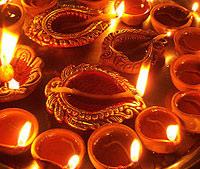Paid Services
Diwali 2017 Celebration – A Five Day Festival

Auspicious occasion Diwali is a five-day festival in India that begins from Dhanteras and concludes on Bhai Dooj. Diwali is celebrated on Hindu month of Kartik during no Moon day. It is one of the major Hindu festivals devotedly celebrated not only in India, but also across the world by people of Indian origin. Sparking major Hindu festival Diwali is truly an occasion of love, light and delicious foods that spread sweetness in our lives. During the celebration of Diwali, people of all caste, creed and regions ignore boundaries of religions and invoke feelings of brotherhood. With huge fervor, we profoundly celebrate Deepawali and other sacred occasions allied to this festival. Dhanteras is celebrated before 2 days of Deepawali. It is a tradition or custom of buying utensils, ornaments or coins of gold or silver, and other items as well as groceries for kitchen and home. A day of Narak Chaturdashi is considered a day before Diwali. Fourth day is admired as ‘Govardhan puja’. And, fifth day is illustrious with name ‘Bhai Dooj’. Let’s read in detail what people do and how they celebrate all 5 days of Diwali.
Dhanteras (Dhan Trayodashi) - Beginning of Diwali
Dhanteras marks the beginning of Diwali. This festival is venerated as an auspicious occasion of wealth and prosperity that falls on Trayodashi (13th day) of Hindu month Kartik during Krishna Paksha (waning moon). Dhanteras symbolizes abundant richness. To celebrate this auspicious day, business premises and houses are wonderfully renovated and decorated. On Dhanteras, people purchase gold, silver, diamond or utensils to invite wealth and prosperity. Dhan is a Hindi word, which means ‘wealth’. It is believed that purchasing coins of gold and silver, jewellery, utensils and other items for home and kitchen is auspicious that brings wealth. In all parts of India, small or big markets are fully packed with huge crowd of people as they all head out to purchase new items for their home. As Dhanteras is the first day of five-day Diwali festival, it invokes people to decorate house and offices with mesmerizing colorful Rangoli and flowers. People start lighting candles and diyas from evening of Dhanteras. It is believed that Dhanteras is a great occasion that brings mammoth happiness, prosperity and abundant wealth. People purchase items as per their needs and affordability. However, jewellery of gold and silver, utensils of steel and aluminum, interior decoration items, electronic items, and kitchen groceries are specially considered for this festival. The purchased items are kept on pooja of Lord Ganesha and Goddess Lakshmi during the day of Deepawali.
According to Hindu mythology, there are several Hindu mythologies that are linked behind celebrating Dhanteras puja. One ancient legend of this occasion is associated with Lord Yama.
Lord Yama is venerated as ‘Lord of Death’. Once, there was a king Hima. He had been given a prediction that his son would meet to death by snake-bite at the age of 16 just after 4th day of his marriage. When his son’s newly-wed wife came to know about this misery, she thought to save her husband. For accomplishing this purpose, she urged her husband for not to sleep on fourth day. To break his sleep, she laid down immeasurable gold and silver coins and ornaments at door of sleeping chamber, illuminated lamps, and began singing a melodious song. When Lord Yama came with face of serpent to kill her husband, he got mesmerized on gleam of gold and silver. Yama also immersed himself in melodious song of that newly-wed lady and forgot to grant death to son of King Hima. Since then, it has become a ritual of lighting lamps and candles throughout the night in adoration of Lord Yama. Performing this brings abundant wealth and prosperity.
Narak Chaturdashi- A day devoted to Kali Puja
Narak Chaturdashi is the second day of five-day festival Diwali. It is also popularly known as chhoti Diwali. This day is also revered with name ‘Kali Chaudas’, which is devoted for Goddess Shakti. As the day falls on fourteenth day of waning moon during month of Kartik, it is known as ‘Kali Chaudas’. Kali means dark or evil. As per Hindu mythology, Goddess Kali (incarnation of Maa Durga) demolished the wickedest Narakasura on the 14th day of Kartik to free earth from his wickedness. Another legend of Narak chaturdashi is also associated with Lord Krishna when he killed Demon Narakasura on this day. Narak chaturdashi is also considered as an auspicious day for practicing tantric puja. Mostly people consider roaming outside their homes inauspicious, during late evening on this day, as Narak chaturdashi is also the day of evil spirits. However, Hanuman pooja or Kali Puja is performed to destroy evil influence from life forever. During the occasion of Narak Chaturdashi, people believe to apply Kajal on eyes to protect themselves from evil spirits. Offering coconut and blessed food to Lord Hanuman during this day is considered fortunate. Innumerable lamps are also lit on this day to illuminate the night of Narak chaturdashi.
Diwali – Lakshmi Ganesh Pooja
On Kartik Amavasya, the festival of Deepawali is celebrated with divine feelings, great zeal and enthusiasm. The day is greatly devoted to worship of Lord Ganesha and Goddess Lakshmi. Celebration of Diwali is also attached with commemoration of Return of Lord Rama and Sita with Lakshmana to their regime Ayodhya after 14 years miseries of Vanvas. It is wonderfully celebrated to welcome eternal blessings and fortunate at home. Varied rituals, customs and traditions are associated in various regions of India. But people of different regions celebrate this festival with the same fervor. This day is grand and major days among all days of Diwali. Houses are wonderfully decorated with flowers and rangoli on this occasion. Idol of Lord Ganesha and Goddess Lakshmi are established during evening of this day to perform Diwali pooja (Laxmi-Ganesh Pooja). Kids and youngsters enjoy igniting firecrackers. people of all age visit their friends, relatives, neighbours and near people’s home. They exchange gifts and sweets and share feelings of love. To invite boundless wealth and prosperity, Lakshmi and Ganesh Puja is performed with full of rituals and traditions. Diwali poojan vidhi is applied to please goddess of wealth - Goddess Lakshmi and lord of fortunes - Lord Ganesha. Varieties of delicious meals, blessed food, sweats are offered to goddess Lakshmi and Ganesh during Diwali pooja. Some prasad items kheel, batasha, barfi are commonly offered to Lord Ganesha and goddess Lakshmi and distributed among relatives and neighbours as Diwali prasad.
Govardhan Pooja
Govardhan Pooja is the fourth day of five-day festival Diwali. It is one of the significant parts of Diwali celebration. Govardhan Pooja is significantly devoted to Lord Krishna. During this day, people worship Lord Krishna, incarnation of Lord Vishnu, and also offer devotion towards adoring credibility of Prakriti (nature). Govardhan Pooja falls in the month of Kartik Shukla Pratipada. It is believed that once Lord Krishna lifted Govardhan parvat (mountain) to protect the people of Vrindavan from heavy rain, which occurred due to the wrath of Lord Indra (lord of rain). Lord Indra became too proud of himself. And thus, Lord Krishna taught inhabitants of Vrindavan to stop worshipping Lord Indra and start worshiping mountain Govardhan. As mountains share great role in nature to bring rain, people of Vrindavan were inspired by Lord Krishna to offer their devotion towards nature, which harmed the ego of Indra.
To commemorate the admiration or victory of Lord Krishna over rage of Lord Indra, Govardhan Pooja is performed with great fervor. In some parts of India, especially in Punjab, Haryana, and Uttar Pradesh, temporary hillocks are wonderfully made of cow dung which are decorated with colorful flowers. In Gujarat, this day is fervently celebrated as ‘New Year’ or Nutan Varsh. People wear new dresses on this day and visit houses of neighbors and near people to cheer up this day. In Maharashtra, the day is celebrated to commemorate King Mahabali. Offering gifts by husbands to their wives is common tradition of this occasion here.
Bhaiya Dooj
Bhai Dooj is the concluding day of Deepawali. It is the fifth phenomenon day of five-day festival of Diwali. Bhai Dooj is celebrated as fifth and last day of Diwali. It falls on dwitiya or dooj (2nd day) of Kartik Shukla paksha (waxing moon) or two days after new moon, to glorify the blessings of sisters toward their brothers (Bhai), thus known as ‘Bhai dooj’. Hindu rituals are performed on this day for brothers and sisters. On the great occasion of Bhai Dooj, sisters offer tilak or sacred red vermilion on forehead of their brothers for their protection, well-being and long life. Like all other days of Diwali, Bhai dooj also shows the great importance among Hindu families. On this fortunate day, sisters invite or welcome their brothers and mark red tilak on their forehead with aarti of diya and flowers. Through this ritual, sisters pray for prosperity and happiness for their brothers. Marking red spot of forehead also protect brothers from evil spirits and eyes. Legend associated to this goes on this way, once Lord Krishna visited home of her sister Subhadra after defeating Demon Narakasur. Sister Subhadra welcomed Lord Krishna with flowers, aarti and offered sacred protective red vermilion on his forehead to bestow him mammoth blessings. Since then, the tradition of marking holy red vermillion mark with raw rice on forehead of brothers became important on the day of Bhai dooj.
Apparently, Diwali is not just a five-day festival, but occasion of bringing fortune, wealth, happiness and prosperity at home. Have a felicitous Diwali! May this Diwali bring immense pleasure and blessings in your life!
 Best quality gemstones with assurance of AstroCAMP.com More
Best quality gemstones with assurance of AstroCAMP.com More
 Take advantage of Yantra with assurance of AstroCAMP.com More
Take advantage of Yantra with assurance of AstroCAMP.com More
 Yantra to pacify planets and have a happy life .. get from AstroCAMP.com More
Yantra to pacify planets and have a happy life .. get from AstroCAMP.com More
 Best quality Rudraksh with assurance of AstroCAMP.com More
Best quality Rudraksh with assurance of AstroCAMP.com More
Get your personalised horoscope based on your sign.



















